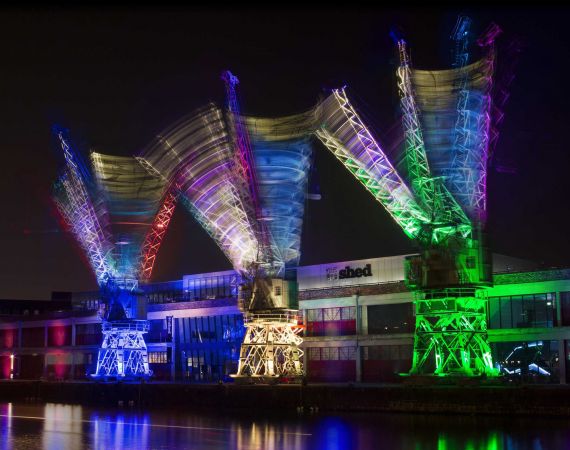Studio blog
Posted on Tue 8 Feb 2022
Creative Technology at Watershed
In this article Martin O'Leary, Watershed's Creative Technologist, talks about how Watershed's relationship to creative technology has changed, and how we plan to move forward in a way that reflects our values

Photo Credit John Rowley
Posted by

Martin O'Leary
As Head of Studio, Martin supports our community of residents in their creative and technical work.The ultimate, hidden truth of the world is that it is something that we make, and could just as easily make differently.
David Graeber, The Utopia of Rules
Forty years ago this June, we opened our doors at Watershed and declared ourselves to be ‘Britain’s First Media Centre’. At the point when satellite TV and Channel 4 were starting up, we wanted to capture and contextualise the shift in media, and its relationship to society. Over the years, we have continued to share that interest with our community. We offered free internet access in our café bar long before it was ubiquitous. When smartphones were still unheard of, we worked with local universities and HP Labs Bristol to explore the potential of mobile communications, sending people out with backpacks of hardware to try and understand what it might mean to engage with technology anywhere and everywhere.
In those early years, it was easier to be optimistic about the role of technology. When we founded the Pervasive Media Studio in 2008, many of us believed that the growth of the internet and social media would be a positive force in the world, and that by bringing together artists, researchers, and technologists we could help to shape a better future. Over the last 14 years this community has done many extraordinary things together that have pushed the boundaries of what is possible.
Today, the tech industry has become one of the most powerful forces in the world: nine of the world’s ten largest publicly traded companies are now tech companies. That growth has made obvious the inequities of the tech industry, the exploitation and injustice that underlie the wealth and power of a small group of people.
Tech has become a fertile ground for a new kind of platform capitalism. From grocery delivery to sex work, tech companies have insinuated themselves between us and the basic necessities of life. Nowhere is this clearer than in the recent push towards a “metaverse”, a virtual world in which every interaction can be controlled, logged, and charged for by whichever multinational tech conglomerate we choose to submit to.
We believe a different future is possible.
Nobody can predict what that future will look like, but we know we want it to be inclusive, sustainable and playful. And we know that we’re going to have to work for it. We also know that not everyone is going to agree on what form that future should take. We’re excited to explore the possibilities.
As we move forward, we want to hold Watershed’s values at the core of what we’re doing. Our ideas are going to evolve over time, but we will remain true to who we are.
Watershed is Inclusive. The tech industry has a massive inclusion problem, and there’s a huge amount of work needed to fix that. But at the same time, we need to acknowledge that even if we can fix the internal problems of the tech industry, we still live in a world where those with technological skills and knowledge have power over those who do not. We want to work towards a future where technical expertise is no longer a route to power, and where humans are no longer seen as a source of problems to be solved with technology. This is a goal of projects like Towards Equitable Futures, which sought to think more equitably about the future by convening a group of people that reflect the systems that we are trying to change.
Watershed is Open and Honest. We’ve always tried to share our skills and knowledge, but we haven’t always been vocal about how we feel about the thorny questions that our work raises. As a team, and as individuals, we have thoughts and feelings about what’s happening in the world of technology, and we shouldn’t be afraid to share them. We also need to acknowledge where we’re unsure or divided. These questions are difficult, and nobody benefits from projecting a false sense of certainty. We’ve begun this process by sharing some of our worries about cryptocurrency, and the way it is encroaching on our cultural spheres.
Watershed Makes Things Happen. It’s important for us to share ideas, to talk about the problems we see in the world, and the solutions we imagine. But ultimately, talk is cheap, and we can’t build a better future by standing around talking about it. We need to take action, to help build alternatives. As an organisation, we will continue to use our resources to encourage a process of thinking through making, and to make material change where we can. Through large collaborative projects like MyWorld, we want to support the production of great creative work, as well as the deep thinking and experimentation that’s needed to get there.
Watershed is Entrepreneurial. We take risks. If we want to build a better future, we’re going to have to try things that haven’t been done before. Some of these will be failures, or have unintended consequences. As an institution, our role should be to help people take those risks, while protecting those who are most vulnerable from the negative consequences. Sometimes this means helping artists to make experimental work with new technology, like in our Layered Realities 5G project. At other times, it’s about recognising the needs of our communities, as with Connecting Through Culture As We Age, where we will work with disabled older people and other minoritized groups to co-design new cultural experiences.
And finally, Watershed is Celebratory. When we work in this critical mode, it’s very easy to fall into a trap of constant negativity. It’s not enough for us to criticise a tech industry we see as unjust and exploitative. As well as that, we need to support and celebrate the work that is leading us towards a better future, and leading us towards a world of social, climate, and economic justice. We do this both through the work that we support directly, and through programmes like our Lunchtime Talks, which celebrate and share the work of our community.
Over the coming months, as we reassert and develop our values, as well as our ideas about Watershed and its relationship with technology, we’ll be sharing more of our thinking and the tools we develop to put these ideas into practice. In the meantime, we’re keen to hear your thoughts, by email, social media, or in person.